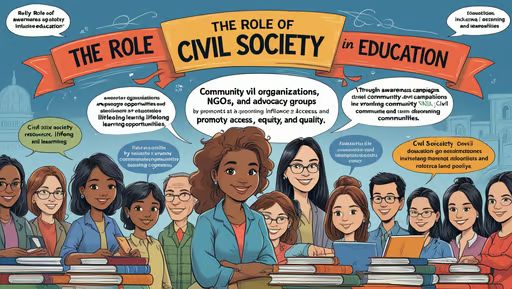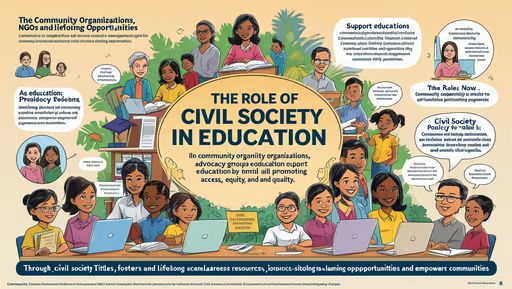Introduction
The Role of Civil Society in Education, Civil society plays a crucial role in shaping education systems worldwide. Comprising non-governmental organizations (NGOs), community groups, advocacy networks, and philanthropic foundations, civil society acts as a bridge between governments and citizens, ensuring that education remains accessible, equitable, and of high quality. In many countries, civil society organizations (CSOs) have been instrumental in filling gaps left by government policies, advocating for marginalized communities, and promoting innovative learning approaches. Their contributions range from policy advocacy and teacher training to providing scholarships and improving school infrastructure. This article explores the multifaceted role of civil society in education, highlighting its impact on policy reforms, community engagement, and sustainable development.
One of the primary ways civil society influences education is by advocating for policy changes that promote inclusivity and quality learning. Governments often face challenges in addressing the diverse needs of students, especially in underprivileged regions. CSOs step in by conducting research, raising awareness, and lobbying for reforms that ensure equal opportunities for all learners. For instance, organizations like Amnesty International and Human Rights Watch have campaigned for girls’ education in developing nations, leading to policy shifts that reduce gender disparities. Additionally, civil society groups monitor government spending on education, ensuring transparency and accountability in resource allocation. By holding authorities accountable, CSOs help create an enabling environment where education systems can thrive and adapt to changing societal needs.
Enhancing Access to Education
A significant contribution of civil society is its efforts to enhance access to education, particularly for disadvantaged groups. Many children in rural and conflict-affected regions face barriers such as poverty, cultural norms, and lack of infrastructure, preventing them from attending school. NGOs like Save the Children and BRAC have implemented programs that provide free schooling, scholarships, and vocational training to underprivileged students. These initiatives not only increase enrollment rates but also reduce dropout levels by addressing socio-economic challenges. Moreover, civil society organizations often establish alternative learning centers for children who cannot attend formal schools, ensuring that no child is left behind in acquiring basic literacy and numeracy skills.
In addition to direct interventions, civil society plays a key role in mobilizing communities to support education. Parent-teacher associations (PTAs) and local advocacy groups encourage parental involvement in school management, fostering a sense of ownership and responsibility. Community-based organizations also work to eliminate harmful practices such as child labor and early marriages, which hinder educational progress. By engaging with local leaders and stakeholders, CSOs create a supportive ecosystem where education is valued and prioritized. Their grassroots efforts complement government initiatives, making education more inclusive and sustainable in the long run.

Improving Quality and Innovation in Learning
Beyond access, civil society contributes significantly to improving the quality of education. Many CSOs focus on teacher training programs, equipping educators with modern pedagogical skills to enhance classroom instruction. Organizations like Teach For All and the Aga Khan Foundation provide professional development workshops, ensuring that teachers are well-prepared to address diverse learning needs. Furthermore, civil society promotes innovative teaching methods, including digital learning and experiential education, which make learning more engaging and effective. In regions with limited resources, NGOs distribute educational materials, such as textbooks and e-learning devices, to improve learning outcomes.
Another critical area where civil society excels is curriculum development and advocacy for inclusive education. CSOs often push for curricula that reflect cultural diversity, gender equality, and human rights principles. They also advocate for special education programs for children with disabilities, ensuring that schools adopt inclusive practices. By collaborating with policymakers, civil society helps design education systems that are responsive to societal changes, such as technological advancements and globalization. Their role in fostering innovation ensures that education remains relevant and prepares students for future challenges.
Advocacy and Accountability in Education
Civil society serves as a watchdog, ensuring that governments fulfill their commitments to education. Through research, reports, and public campaigns, CSOs highlight systemic issues such as corruption, inadequate funding, and poor infrastructure. Organizations like Transparency International and Global Campaign for Education monitor budget allocations and demand greater investment in education. Their advocacy efforts have led to increased public spending on schools in many developing nations. Additionally, civil society engages in legal activism, filing lawsuits or petitions to enforce the right to education, particularly for marginalized communities.
Moreover, CSOs play a vital role in crisis situations, such as natural disasters or conflicts, where education systems are disrupted. They provide emergency schooling, psychological support, and rehabilitation programs to affected students. For example, during the Syrian refugee crisis, NGOs established temporary learning centers to ensure displaced children continued their education. Such interventions demonstrate civil society’s adaptability and commitment to safeguarding education in challenging environments.
Conclusion
The role of civil society in education is indispensable. From advocating for policy reforms to improving access and quality, CSOs complement government efforts and address gaps in the education sector. Their grassroots initiatives, innovative approaches, and accountability mechanisms ensure that education remains a fundamental right for all. As global challenges such as inequality, digital divides, and climate change impact learning systems, civil society’s role will become even more critical. Governments, international agencies, and private stakeholders must collaborate with CSOs to build resilient and inclusive education systems. By strengthening this partnership, societies can achieve sustainable development and empower future generations through quality education.

8 thoughts on “The Role of Civil Society in Education”
Comments are closed.